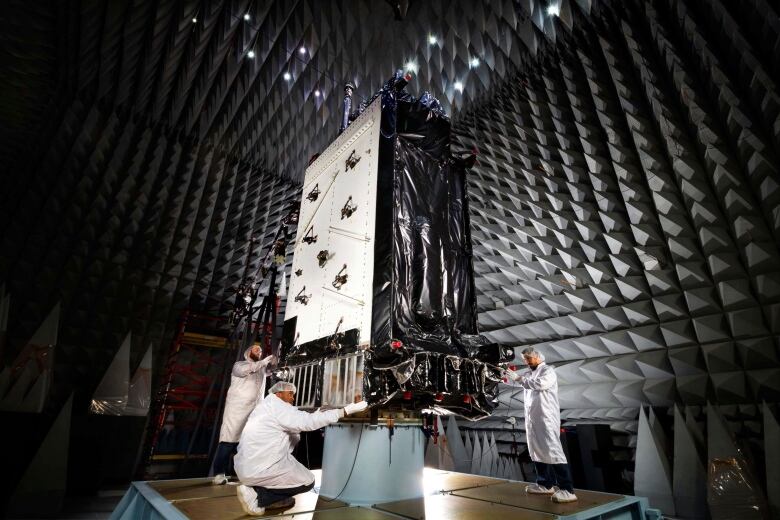SpaceX postpones next-generation GPS satellite launch
Company says it needs to do further checks, will confirm new launch date once complete

Elon Musk's SpaceXon Wednesday postponed its second attempt to launch a long-delayed navigation satellite for the U.S. military, a day after an aborted launch.
SpaceX's Falcon 9 rocket, carrying a roughly $500 million US ($672 million) global positioning system (GPS) satellite built by Lockheed Martin Corp, was originally due to take off from Florida's Cape Canaveral shortly after 9:30 a.m. ET Tuesday, but was stopped minutes before takeoff.
"This abort was triggered by the onboard Falcon 9 flight computer," a SpaceX official narrating the launch sequence said. He said SpaceX would attempt the launch on Wednesday morning.
SpaceX later tweeted that the Falcon 9 and payload remain healthy and that it delayed the launch because of an "out of family" reading on the rocket's first stage sensors.
But on Wednesday, hours before the scheduled second launch attempt, the company tweeted that it needed to further evaluate the sensor readingon the rocket, and would confirm a new launch date once that was complete.
Standing down from todays launch attempt of GPS III SV01 to further evaluate out of family reading on first stage sensors; will confirm a new launch date once complete.
—@SpaceXA successful launch would be a significant victory for Musk, a billionaire entrepreneur who spent years trying to break into the market for lucrative military space launches, long dominated by Lockheed and Boeing Co.
SpaceX sued the U.S. Air Force in 2014 in protest over the military's award of a multibillion-dollar, non-compete contract for 36 rocket launches to United Launch Alliance, a partnership of Boeing and Lockheed.

SpaceX dropped the lawsuit in 2015 after the Air Force agreed to open up competition, according to SpaceX's website.
The next year, SpaceX won a $83 million US ($112 million) Air Force contract to launch the GPS III satellite, which will have a lifespan of 15 years, Air Force spokesman William Russell said by phone.
Tuesday's launch was to be the first of 32 satellites in production by Lockheed under contracts worth a combined $12.6 billion US ($17 billion) for the Air Force's GPS III program, Lockheed spokesman Chip Eschenfelder said.
DYK, this #GPSIII satellite carries the signatures of @VP and @SecAFOfficial? They signed thermal blankets during their visit to our GPS clean room last year. pic.twitter.com/gSg332TMwp
—@LockheedMartinU.S. Vice President Mike Pence traveled to Florida to attend the launch, which he called "an important step forward as we seek to secure American leadership in space."
3 times more accurate
"Once fully operational, this latest generation of GPS satellites will bring new capabilities to users, including three times greater accuracy and up to eight times the anti-jamming capabilities," said Russell.
Current civilian GPS receivers are accurate to within 3to 10 metres (10 to 33 feet), depending on conditions, said Glen Gibbons, the founder and former editor of Inside GNSS, a website and magazine that tracks global navigation satellite systems.

With the new satellites, civilian receivers could be accurate to within 1 to 3 metres (3 to 10 feet) under good conditions, and military receivers could be a little closer, he said.
Only some aspects of the stronger, jamming-resistant military signal will be available until a new and complex ground control system is available, and that is not expected until 2022 or 2023, said Cristina Chaplain, who tracks GPS and other programs for the Government Accountability Office.
Civilians can use itafter2022
Chaplain said the new civilian frequency won't be available at all until the new control system is ready.
The GPS satellite launch was originally scheduled for 2014 but has been hobbled by production delays, the Air Force said.

The next GPS III satellite will launch in mid-2019, Eschenfelder said, while subsequent satellites undergo testing in the company's Colorado processing facility.
GPS is best-known for its widespread civilian applications, from navigation to time-stamping bank transactions. The Air Force estimates that 4 billion people worldwide use the system.
But it was developed by the U.S. military, which still designs, launches and operates the system. The Air Force controls a constellation of 31 GPS satellites from a high-security complex atSchrieverAir Force Base outside Colorado Springs.
GPS III also will provide a new civilian signal compatible with other countries' navigation satellites, such as the European Union's Galileo system. That means civilian receivers capable of receiving the new signal will have more satellites to lock in on, improving accuracy.
"If your phone is looking for satellites, the more it can see, the more it can know where it is," said Eschenfelder.
The launch marks SpaceX's first so-called National Security Space mission as defined by the U.S. military, SpaceX said.
The Hawthorne, California-based company has previously launched payloads for the Department of Defense in 2017 that were not designated as a National Security Space missions.
Ground control issues
The new ground control system for GPS III, called OCX, faces even more delays than the satellites. OCX, which is being developed by Raytheon, is at least four years behind schedule and is expected to cost $2.5 billion US ($3.4billion) more than the original $3.7 billion US ($5 billion), Chaplain said.

The Defence Department has struggled with making sure OCX meets cybersecurity standards, she said. A Pentagon review said both the government and Raytheon performed poorly on the program.
Raytheon has overcome the cybersecurity problems, and the program has been on budget and on schedule for more than a year, said Bill Sullivan, a Raytheon vice-president in the OCX system.
The first #GPSIII #satellite is named "Vespucci" for the Italian explorer the Americas were named after. Once it launches for space tomorrow, it will join 31 operational #GPS II satellites delivering positioning, navigation and timing services for the U.S. https://t.co/EBkfBYxDzF pic.twitter.com/7PIw3SZYgI
—@RaytheonSullivan said the company is on track to deliver the system to the Air Force in June 2021, ahead of GAO's estimates.
The Air Force has developed work-arounds so it can launch and use GPS III satellites until OCX is ready to go.
While the first GPS III waits for liftoff in Florida, the second is complete and ready to be transported to Cape Canaveral. It sits in a cavernous "clean room" at a Lockheed Martin complex in the Rocky Mountain foothills south of Denver.
It's expected to launch next summer, although the exact date hasn't been announced, said Jonathon Caldwell, vice-president of Lockheed Martin's GPS program.
For the first time, the Air Force is assigning nicknames to the GPS III satellites. The first one is Vespucci, afterAmerigoVespucci, the Italian navigator whose name was adopted by earlymapmakersfor the continents of the Western Hemisphere.
With files from the Associated Press












_(720p).jpg)


 OFFICIAL HD MUSIC VIDEO.jpg)
.jpg)



























































































